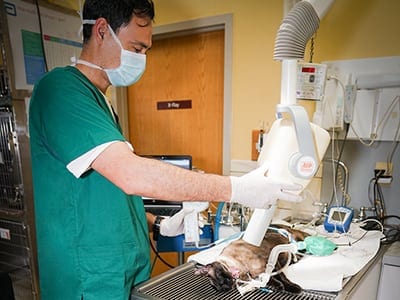Cat and Dog Teeth Cleaning in Miami, FL
The thought of brushing your dog and cat’s teeth might seem silly, but routine dental care is just as important for your pet as it is for you. In fact, according to the American Veterinary Dental College, many pets suffer from periodontal (gum) disease, which can develop when they are as young as 3 years old. Periodontal disease is a common inflammatory condition that can be prevented with brushing and routine dental cleanings. Brushing your pet’s teeth may be difficult, especially if your companion happens to be a cat, but we would be happy to offer alternatives to help you maintain their teeth and gums. Give us a call at (305) 663-3300 to find out more.


Our Pet Dental Care Services
Since periodontal disease is so prevalent in our four-legged family members, we take pet dental care very seriously. We are pleased to offer the following services to preserve your companion’s pearly whites:
- Oral exam/consultation
- Pre-dental diagnostics
- Digital dental X-rays
- Dental cleaning (performed with ultrasonic scaling tool)
- Dental extractions (as needed)
Ideally, we would like to see your pet at least once a year for their wellness check. During this visit, we can examine their mouth and discuss any observations you have made at home to determine whether a teeth cleaning will be necessary. Certain breeds seem to be more susceptible to gingivitis or periodontal disease, and may require more frequent cleanings.
Symptoms of Pet Periodontal Disease
It’s important to recognize the signs of periodontal disease in your pet before they get worse. Symptoms include:
- Bad breath
- Red, inflamed gums
- Yellow/ brown teeth
- Loose/broken teeth
- Swelling around mouth/face
- Excessive drooling
- Difficulty chewing and/or eating (dropping food)
- Decreased appetite
- Pawing at face/mouth
At-Home Dog & Cat Teeth Cleaning
If possible, start your pet on a teeth brushing routine as early in their development as possible. This way, they will become acclimated to the experience, which will make it easier for you to maintain a routine brushing schedule.

We also suggest trying a dental-specific diet—you may be surprised, but canned food can actually accelerate the buildup of plaque on the teeth and lead to gingivitis much more quickly. You can also supplement your pet’s dental care routine with dental wipes and OraVet dental chews to slow plaque buildup.
If your pet is displaying any of the symptoms listed above, please get in touch with us at (305) 663-3300 or by requesting an appointment so we can assess their condition. Our goal is to preserve your pet’s teeth and keep their mouth healthy for as long as possible.
